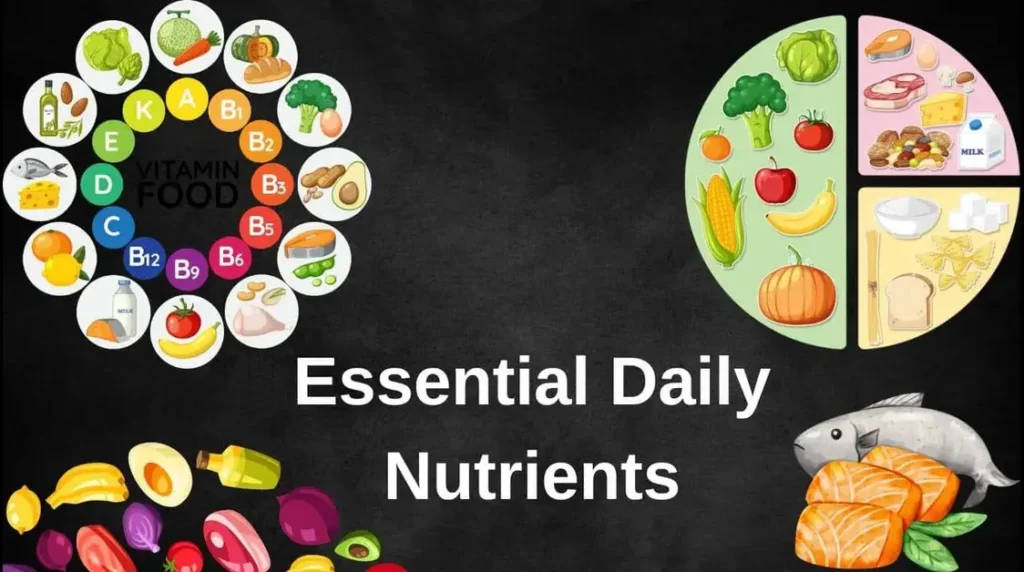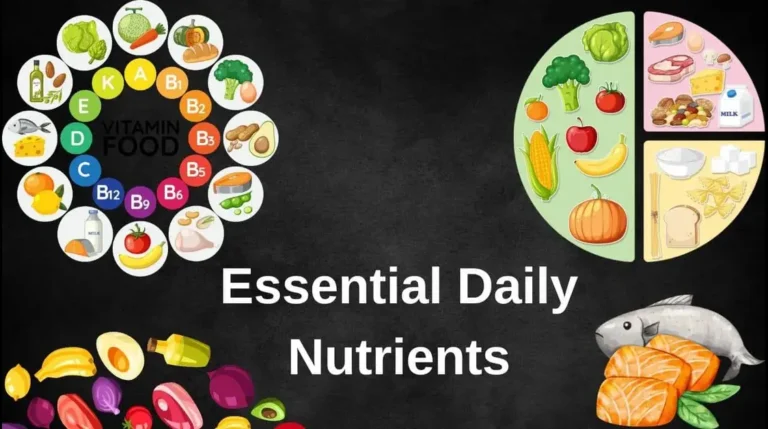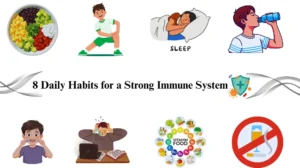We all want physical fitness, but to keep our bodies healthy, we need proper nutrition. All these important nutrients are essential for our body. They help prevent diseases, increase strength, and repair tissues.
Below, we will discuss the nutrients that our body needs, which are also present in our daily diet. We will also see how these nutrients benefit our body.
Table of Contents
ToggleWhat Are Essential Daily Nutrients?
Basic nutrients help keep our bodies healthy. These nutrients are divided into two categories, namely macronutrients and micronutrients.
Carbohydrates, proteins, and fats are, for instance, called macronutrients because large quantities are required. These provide energy for our body and contribute to the process of muscle and organ development. At the same time, there are small amounts that are just as critical, and these are categorized as micronutrients, which include the vitamins and minerals. Some of them help to regulate our bodies and make sure everything is functioning as it should.
Both macro- and micronutrients are important in the human body to provide for all the requirements. From learning what macronutrients and micronutrients are, we know what foods to buy better. That is why it helps us live a nutrient-rich life.
Importance Of Macronutrients
Macronutrients such as carbohydrates, proteins, and fats are very important for our health. These nutrients help increase digestion, increase immunity, repair tissues, and help muscle growth. These nutrients also work very well in weight management. Make your physical health stronger by adding macronutrients to your daily diet.
Carbohydrates provide us with the energy needed for body activities and exercises. Proteins play a role in repairing and constructing tissues that are important for muscular development and repair. Fats function in producing hormones and nutrient absorption, and in preserving body organs.
Importance Of Micronutrients
Just like macronutrients, micronutrients are equally important for our health. These micronutrients are vitamins and minerals. Vitamins play a significant role in the majority of body activities. They also build our immunity and assist in vision and the production of red blood cells. Like vitamins, minerals are also important. It provides our body with a mineral that keeps our balance, makes the nerves and muscles work properly, and much more.
To keep our bodies healthy, we need two types of nutrients, macronutrients and micronutrients, in the right amounts. If any of them is lacking, our body may experience problems like weakness, fatigue, weight loss, and decreased ability to resist diseases.
Below, we will discuss some important essential nutrients.
Essential Nutrients
1) Vitamins:-
Vitamins are important for good health. Vitamins help prevent diseases, keep the skin healthy, and increase brain function. In other words, it can be said that vitamins are necessary for overall health.
Vitamins are mainly divided into two groups: water-soluble vitamins and fat-soluble vitamins. Water-soluble vitamins include all the vitamins in the B vitamin group and vitamin C. Fat-soluble vitamins include vitamins A, D, K, and vitamin E.
Water-soluble vitamins help maintain healthy skin and hair, increase immunity, and eliminate weakness. On the other hand, fat-soluble vitamins are stored in body fat and the liver. These nutrients are important for bone health, eye health, and blood clotting.
2) Carbohydrates:-
Carbohydrates are a significant source of energy in the human body. Receptors are necessary for many bodily functions to take place. Carbohydrates can be complex and simple based on the speed with which they are broken down in the body.
The glycemic index is used when considering carbohydrates. These include sugars that take a very short time to circulate in your body, which may be harmful. This can cause sudden low energy and may even be a factor in weight management.
On the other hand, the complex carbohydrates in whole grains, fruits, and vegetables have a lower glycemic index. These provide continual avalanches of energy.
Consuming complex carbohydrates in our diet is crucial for energy, weight, and overall health improvement. Such carbs contain fiber, vitamins, and essential minerals useful to the body. They are important for a meal. Carbohydrates and how they work in the body allow a person to make better choices on what to eat. Thus, you can sustain good energy, have control of your weight, and keep yourself fit.
3) Protein:-
Like other important nutrients, our body needs protein, whether it is animal protein or plant protein. It helps to strengthen our bones. It also helps in muscle gain, metabolism, and weight control. Foods containing animal protein have more benefits than foods containing plant protein. You can eat any type of protein, but you should definitely include protein-rich foods in your daily diet.
4) Fats:-
Many of us have misconceptions about fat, thinking that fat is not good for our health, but this is not true. Not all fats are the same. One needs to limit intake of saturated fats, and others are considered to be healthy fats. All trans fats, including omega-3 fatty acids, are beneficial to your brain and heart.
Omega-3 fatty acids then assist in maintaining the health of your heart by controlling cholesterol and the subsequent risk of heart disease. They also possess the capacity to help in the support of brain activity that enhances thinking and mood, hence a healthier brain.
The other unsaturated fats contain monounsaturated fats or polyunsaturated fats, known to be equally healthy for the human body. It can lower the risks and progression of inflammation, be effective in weight loss, and enhance vitamin and mineral absorption.
5) Minerals:-
The human body needs minerals like calcium, potassium, sodium, and magnesium. Calcium strengthens bones, magnesium helps increase muscle performance, iron carries oxygen and eliminates physical weakness, and zinc helps in healing wounds and keeping the thyroid healthy.
Essential Nutrients And Their Food Sources
Vitamins
Vitamin A:- Fish, Milk, Spinach, Apricots, Mangoes, Pumpkin, Broccoli, Beef Liver, Egg
Vitamin B1:- Whole Grains(Brown Rice, Oatmeal), Legumes, Sunflower Seeds,
Potatoes, Fish(Tuna, Salmon), Oranges
Vitamin B6:- Chickpeas, Chicken, Bananas, Avocado, Spinach, Cereals, Watermelon
Vitamin B12:- Oyster, Almond, Yogurt, Tuna, Beef Liver, Chicken
Vitamin C:- Oranges, Guava, Kale, Pineapple, Kiwi, Strawberries, Broccoli, Tomatoes, Lemon
Vitamin D:- Fatty Fish, Egg Yolks, Milk, Cheese, Tofu, Yogurt
Vitamin E:- Almonds, Sunflower Seeds, Avocados, Peanut Butter, Wheat Germ Oil,
Broccoli, Mango
Carbohydrate
Oats, Quinoa, Apples, Whole Wheat Bread, Potatoes, Bananas, Beetroot, Peas
Protein
Eggs, Chicken Breast, Salmon, Tofu, Yogurt, Almond, Peanut Butter, Lentils, Lean Beef, Quinoa
Fats
Avocado, Nuts and Seeds, Dark Chocolate, Olive Oil, Eggs
Minerals
Calcium:- Cheese, Spinach, Greek Yogurt, Chia Seeds, Almonds, Beans, Oranges, Tofu
Potassium:- Salmon, Coconut Water, Pumpkin Seeds, Spinach, Broccoli, Banana
Conclusion
We discussed some essential nutrients that are very important for our good health. These are found in our daily diet.
Introducing nutrients in our meals helps us to be healthy. About the subject, one has to carefully consider how lifestyles impact the body’s ability to absorb these nutrients. Thus, the long-term model for wellness can be attained.
Frequently Ask Question
1) Why are macronutrients important?
Ans:- Macronutrients such as carbohydrates, proteins, and fats help us increase our energy, prevent disease, and repair tissues. Therefore, macronutrients are very important for our bodies.
2) What are the 5 main nutrients?
Ans:- Carbohydrate, Protein, Fats, Minerals, and Vitamins.
3) How can I track my nutrient intake effectively?
Ans:- Through the app, you can check your daily nutritional intake. You can also note them in a diary. You can adopt any method at your convenience.







